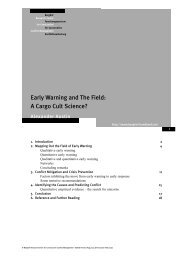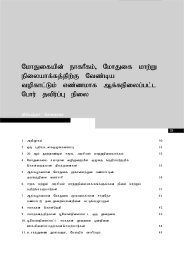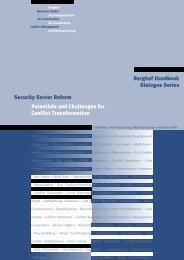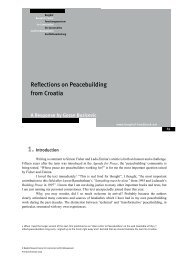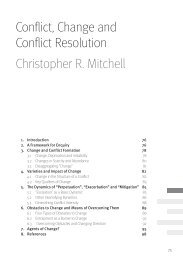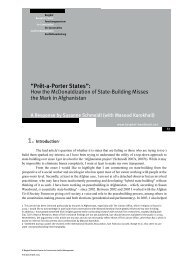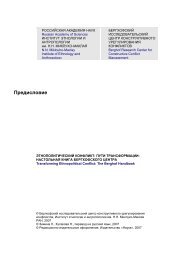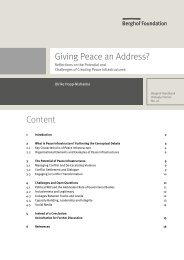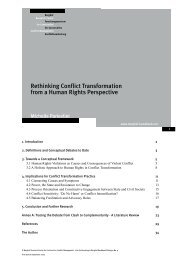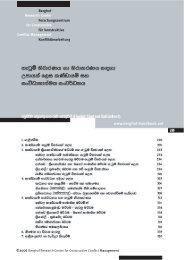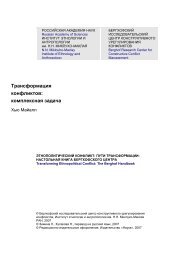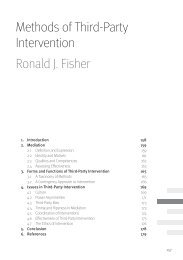Human rights and conflict transformation: The challenges of just peace
Human rights and conflict transformation: The challenges of just peace
Human rights and conflict transformation: The challenges of just peace
Create successful ePaper yourself
Turn your PDF publications into a flip-book with our unique Google optimized e-Paper software.
<strong>Human</strong> Rights Activists Conflict Resolvers<br />
<strong>The</strong>y tend to be universalistic rather than<br />
contextual.<br />
<strong>The</strong>y tend to use rules as a point <strong>of</strong> reference (are<br />
legalistic).<br />
<strong>The</strong>y tend to view <strong>conflict</strong> resolvers as ‘idealistic’<br />
(as they always say, what we want is possible in an<br />
ideal world, but not in a realistic one).<br />
<strong>The</strong> approach they use takes into account the<br />
context <strong>and</strong> stage <strong>of</strong> the <strong>conflict</strong>.<br />
<strong>The</strong>y tend to want <strong>peace</strong> at all costs; even at the<br />
cost <strong>of</strong> breaking rules or norms i.e. encouraging<br />
impunity.<br />
<strong>The</strong>y tend to view human <strong>rights</strong> activists as<br />
spoilers.<br />
B) Dealing with the Past<br />
<strong>Human</strong> <strong>rights</strong> <strong>and</strong> <strong>conflict</strong> resolution are especially in tension when issues <strong>of</strong> responsibility<br />
for past violations are raised. <strong>The</strong> question they confront is the following: after a number <strong>of</strong> years<br />
<strong>of</strong> war, suffering <strong>and</strong> pain, like in the case <strong>of</strong> northern Ug<strong>and</strong>a, should communities forget their<br />
years <strong>of</strong> torment to achieve healing – as many <strong>conflict</strong> resolvers would want – or should they seek<br />
accountability, punish the guilty, establish the truth <strong>and</strong> circumvent impunity in order to achieve<br />
sustainable <strong>peace</strong> – as largely human <strong>rights</strong> activists have argued?<br />
Post-<strong>conflict</strong> societies like those in northern Ug<strong>and</strong>a, southern Sudan <strong>and</strong> in the Democratic<br />
Republic <strong>of</strong> Congo (DRC) are all faced with the conundrum <strong>of</strong> sustainable <strong>peace</strong> <strong>and</strong> <strong>just</strong>ice. While<br />
some seek for <strong>just</strong>ice at all costs to avoid encouraging impunity, other segments <strong>of</strong> society would<br />
rather forget about the horrific <strong>and</strong> traumatic past <strong>and</strong> move on with hope <strong>and</strong> confidence, in fear<br />
that the continued quest for <strong>just</strong>ice could slide society back to <strong>conflict</strong>. It can be very difficult to<br />
balance the two.<br />
In northern Ug<strong>and</strong>a, a region marked by eighteen years <strong>of</strong> insurgency 1 by the Lord’s<br />
Resistance Army (LRA), amnesty laws were created in order to promote national reconciliation<br />
<strong>and</strong> to ensure stable <strong>and</strong> sustained <strong>peace</strong>. In fact, President Yoweri Museveni has <strong>of</strong>fered amnesty<br />
to the LRA leaders <strong>and</strong> other rebel groups if they secure <strong>peace</strong>. Under the amnesty act, rebels must<br />
genuinely ab<strong>and</strong>on <strong>and</strong> renounce their crimes (Ug<strong>and</strong>a Amnesty Act 2000). Over 17,000 have<br />
already done so <strong>and</strong> are being reintegrated into their communities.<br />
By contrast, others in the region argue that <strong>just</strong>ice should prevail in regard to the<br />
atrocities committed by the LRA, <strong>and</strong> strongly support the indictments issued by the International<br />
Criminal Court (ICC) against five <strong>of</strong> its leaders. 2 <strong>The</strong> ICC was founded on the basis that there can<br />
be no durable <strong>peace</strong> without <strong>just</strong>ice which to some extent satisfies victims that wrongs have been<br />
addressed. However, a good number <strong>of</strong> the people <strong>of</strong> northern Ug<strong>and</strong>a I have spoken to are against<br />
the indictment <strong>of</strong> the LRA leaders because they believe that this might thwart the <strong>peace</strong> process.<br />
One <strong>of</strong> the victims, Ochan Opira, said “though the LRA inflicted suffering on our people <strong>and</strong> region,<br />
1 According to International Crisis Group, the <strong>conflict</strong>, which produced great suffering in northern Ug<strong>and</strong>a, including some 1.5<br />
million internally displaced persons (IDPs), had four main characteristics. “First, it was a struggle between the government <strong>and</strong><br />
the LRA. Secondly, it was a <strong>conflict</strong> between the predominantly Acholi LRA <strong>and</strong> the wider Acholi population, who bore the brunt<br />
<strong>of</strong> violence that included indiscriminate killings <strong>and</strong> the abduction <strong>of</strong> children to become fighters, auxiliaries <strong>and</strong> sex slaves.<br />
This violence is aimed at cowing the Acholi into submission <strong>and</strong> discrediting the government. Thirdly, it is fuelled by animosity<br />
between Ug<strong>and</strong>a <strong>and</strong> Sudan, who support rebellions on each other’s territory. Finally, it continues the North-South <strong>conflict</strong> that<br />
has marked Ug<strong>and</strong>an politics <strong>and</strong> society since independence” (ICG 2004, Executive Summary).<br />
2 <strong>The</strong>y are Joseph Kony, Dominic Ogwen, Okot Odhiambo, Vincent Otti <strong>and</strong> Raska Lukwiya; the last two have died since the<br />
indictment was issued. See “Ug<strong>and</strong>an top rebel leader indicted”, BBC World Service News, 7 October 2005; http://news.bbc.<br />
co.uk/2/hi/4320124.stm (accessed 16 Feb 2010).<br />
Albert Gomes-Mugumya<br />
77



